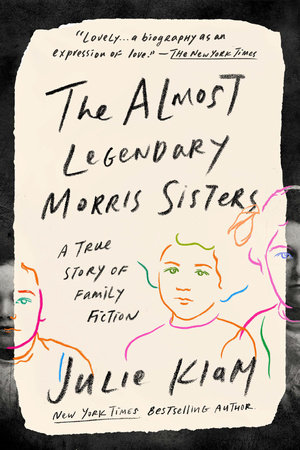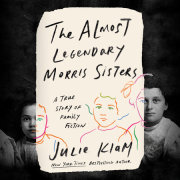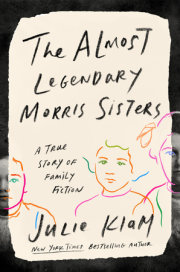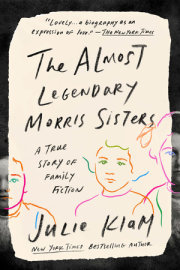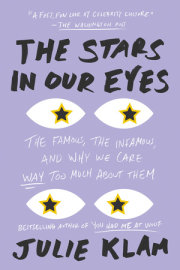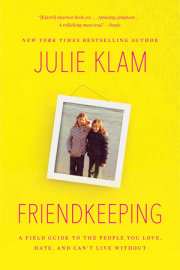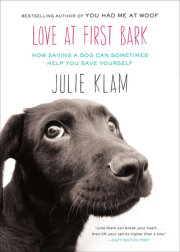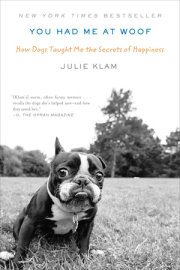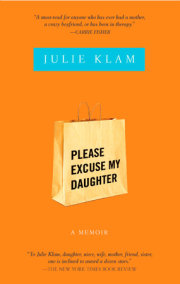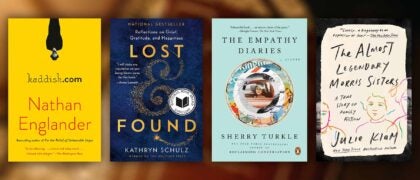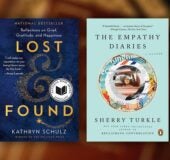One
I'd Like to Introduce My Family
When I was five years old, I noticed that my second toe was longer than my other toes. I noticed this because my grandma Billie, my father's mother, had pointed out how beautiful her own feet were because her toes were "graduated"-they were sized in ascending order. Then she looked at my feet and was silent.
Later, I mentioned to my mother what Grandma Billie had said, and she replied with extraordinary conviction, "People who have a long second toe are descended from royalty." My mother, I realized later, also has a long second toe. We were the Queen and the Princess of the Land of Goofy Feet.
At the time, I was young enough and unworldly enough that I accepted her explanation. And I knew instinctively that it wasn't something I was to talk about with other people; I didn't need to flaunt my superior lineage. I just kept the information in my back pocket, like an undercover detective with a hidden badge. If I needed to reveal it, I could, but mostly it was enough for me to know.
I've never taken a DNA test or any of the other tests available, mostly because I don't really care to know what someone else finds in me. I'm descended from royalty; does anything else really matter?
I'm willing to admit that I might not be Queen Elizabeth's distant cousin, but somewhere inside me that little fact-along with many, many other questionable details I was told about my family growing up-floats around in my personal identity orbit and gives me a gentle pat on the back when life gets tricky. It's okay when my credit card gets declined; I am descended from royalty.
When a friend of mine found out that her husband had been having affairs for seventeen of the eighteen years they were together-through four pregnancies and years of romantic vacations-she had the most difficult time reconciling the life she thought she'd led with the one she'd actually had. And also, reconciling herself with the fact that if she'd never found out, her life would have felt as it always had. It was the discovery that changed it. When I was younger I told my brothers that when our parents eventually died, no one should tell me for as long as possible. Let me go on and pretend that they just were too busy to pick up the phone. Maybe even record a few messages to leave for me every now and again. I clearly feel as if what I don't know can't make me sad.
It's not that I feel like I need to be protected from bad news . . . well, maybe it is that.
I think about that a lot-about how much of what defines us at various points in our lives is based on what we are told by the people we trust. Growing up, I had friends who told me they had exotic or interesting backgrounds-that they were part Sioux or Cherokee (hello, Cher? though we were just friends in my head), or that their parents once spent the evening in a New York City nightclub with Muhammad Ali and his wife, or that a friend's mother had gone trick-or-treating with Judy Garland when they were kids. And the family lore I grew up around-the strange people my relatives knew or the exciting places they'd visited, some of which turned out to be true, a lot of which turned out to be embellished, most of which was definitely curated-all goes into how we present ourselves, our lives, and our pasts to the world.
As a young kid, I was a so-so athlete (so, so terrible), and I did almost comically poorly in school ("I just don't understand how you can get a negative grade on an exam," my father once said). I wasn't conscious of the fact that other kids in sixth grade showered and washed their hair regularly until a girl in my class said for Valentine's Day she was going to give me a heart-shaped bottle of Head & Shoulders. (She did not.) So while I was often oblivious to the world around me, I knew that secretly I was very special. (Maybe it was the royal feet.)
In my defense, we were a weird family. We lived in a town where some of the people were Waspy publishers and senior vice presidents of banks, and others owned the local hardware store or drove the school bus. Their kids, my peers, were not Jewish, and their parents did not come from New York City. And the kids whose parents were bankers went to private school and I didn't, so I didn't really mix with them except during tennis and riding lessons (I know how it sounds, but trust me, I was the worst one, and remember I had the greasy hair), and the kids I went to school with were all in church together. So I sort of felt like an outsider in two places.
In college (I got into one!), I found out I had a learning disability. Maybe I hadn't been so dumb or lazy in high school, and even though I hadn't been good at sports like field hockey-or anything with a ball, really-I started running and going to the gym and found that if I worked at it consistently, I was actually pretty strong and fast. (Give me that President's Physical Fitness Test now!) Fortunately, this all occurred when I was young enough to incorporate these notions and changes in my behavior into my life.
After college, I came to the conclusion that I was not really good at working. I found a job working for a judgmental, hostile gentleman who criticized me constantly-so much so, in fact, that I assumed I was just terrible at my job. As I watched my friends begin to climb the ladders in their fields, earning more money and more responsibility, I was working at an insurance company and taking writing workshops on the side. I submitted one piece to a magazine, it was rejected, and I then decided that I wasn't good enough to make a career as a writer. I was always quick to allow myself to be defined by failures. Those somehow made sense to me. The women in my family succeeded in more traditional senses-cooks, homemakers, mothers. And based on what I knew about my family and history, it was what I expected for myself. That was my family narrative. But it's possible to learn something new about yourself or your family that changes the perspective and the narrative.
Every family has stories. Some people grow up hearing about their ancestors who were heroic or died violently. The accused Salem witch. The pioneer who lost a leg to frostbite but managed to walk four hundred miles to settle his family and strike gold. Families who immigrated from Ireland or India, and the people who were not brought here by choice. All of these tales go into how we define ourselves. Are we from hardworking peasant stock or from enslavers? Do we live where our ancestors did or are we scattered all over? How does knowing where we are from inform who we are now?
I heard a lot of stories growing up about my great-grandparents who came from exotic distant lands, Russia, Moldova, Bessarabia (which sounded very Aladdin-like to me), but the one story that stuck with me was an unusual one about the Morris sisters. They were, the family lore had it, four sisters who came to America sometime in the last century and were orphaned in the Midwest but somehow managed to get to New York City and become millionaires-without relying on any man-and lived in one house together. I thought of them as my great-aunts, but actually they were my paternal grandmother's first cousins, so technically they are my first cousins twice removed.
The story fascinated me; I had never heard anything like it before. It was as if the four sisters from Little Women had somehow been reimagined in the twentieth century and banding together had become wealthy through their own talents and ambitions. When I was a kid, I imagined they were Rich Uncle Pennybags from Monopoly, or in this case Rich Aunt Pennybags whose lives were luxurious, interesting, and sparkly. It took me forty years to realize that only one of those adjectives was true.
It turned out there was as much, if not more, misinformation about the Morris sisters than there were facts. People who grow up in the twenty-first century with so much information immediately available to them might have difficulty imagining how it was possible for everyone-in this, everyone in an extended family-to misremember, misunderstand, or misconstrue so many details about members of their own family. How could so many intelligent people throughout a family tree have so many verifiable facts so wrong? I actually understand it pretty well. Memory is funny. What we hear, what our brain chooses to highlight, is part of it. And if you hear something you aren't familiar with, your brain might turn it into something familiar. You can get a smattering of facts and piece them together, not even realizing you're filling in blanks with your own imagination.
I would learn that finding the truth in a family can be tricky.
For example, in 1999, when my grandfather died, my father had to get his birth certificate for New York State to issue his death certificate. My father called the office of records in New York City and talked to a man who worked in the department-that's what you did at the time to get information. The man wrote down my grandfather's name and put the phone down (my dad heard shuffling and file cabinet drawers opening in the background). Five minutes later the man returned to the phone to tell my father that he had a paper copy of my grandfather's birth certificate. All of my father's life the one detail he knew for certain about his father was that his birthday was on Halloween, October 31. To my brothers and me, this was significant, because we were children and Halloween was among the most fun days of the year.
Only it wasn't true. My grandfather's real birthday was November 9, nine days after Halloween. It's not as if my grandfather had a secret wife or a hidden family, but learning this shocked my family. The truth can do that.
Several years before that I was a sophomore in college, and I remember sitting at my aunt Mattie's dining room table in Manhattan, thumbing through an ASCAP magazine (that is the American Society of Composers, Authors and Publishers). Something in the magazine must have jogged my memory, as I mentioned to her that I was related to Irving Berlin.
She came out of the kitchen and looked at me.
"Who in your father's family is related to Irving Berlin?" she asked.
(There might have been a subtext of "who in your father's loser family was related to one of the greatest composers of all time?" She loves my father, but she was suspicious that his tone-deaf family could be related to the man responsible for "White Christmas".)
"Not my father," I declared, "my mother!"
She blinked at me a few times.
"If my sister is related to Irving Berlin, then I am related to Irving Berlin," Aunt Mattie said. "And I'm not related to Irving Berlin."
We immediately called my mother, and she and Mattie got into one of those conversations that sisters do, which run along the lines of "wasn't Aunt Rae's cousin's wife . . ." And lo, it turned out that my mother was wrong. I was no more related to Irving Berlin than I was to Julius Erving.
My mother wasn't embarrassed or upset when she realized she was wrong. "I guess I was thinking of someone else," she said.
Perhaps we were related to a different Irving Berlin, or the Irving who owned a discount furniture store in Berlin, Ohio.
"Well, we were related to Hartz Mountain!" Mom said proudly.
So now I'd go back to the five million people I'd told I was related to the great American songwriter and tell them that I'm not related to Irving Berlin but actually to the flea prevention people. Or maybe I wouldn't because I had always loved my quirky, cool pedigree. So what if it wasn't true? Who was going to find out?
That conversation was way back in 1985, before the World Wide Web was born, so at the time a lot of stories about family and ancestry were taken at face value. When someone told me he was related to Elizabeth Cady Stanton, I couldn't ask for proof from Ancestry.com, so I didn't ask for any documentation. I just believed him. And as a kid if my parents said we were one-eighth Inuit, I would assume that they were telling the truth, just as I assumed my relative had written "God Bless America" because my mother had once mentioned it.
I'm sure we all know people who have dazzling (or at least interesting) stories about their lineage. Your grandfather's cousin, who was the captain of the Mauretania. Your mother's best friend, who was Theda Bara's makeup artist, Persian royalty, or Irving Berlin. It was always lovely to hear these stories, and the only necessary reaction is to just say, "Wow."
Why are these stories from our families so flawed? Many reasons. Oral history is not unlike a game of telephone: Even when people are trying to get the story right, it gets twisted in unexpected ways-and not necessarily in the ways we think. One detail you hear a lot when someone is investigating their family is that their family's name was changed when they immigrated-at Ellis Island, for example-because the clerks didn't speak the language of the immigrant and wrote down whatever name they felt like. My grandfather told me his grandfather had been named Kuperschmidt, but the Ellis Islands officials (he had a less polite term for them) changed it to Smith.
But this is not actually true. When people came through Ellis Island during the sixty-two years that it was open as an immigration station, the only information the immigration clerks had was the steamship's manifest with the names of the incoming immigrants. These had been filled in by the ship's officials in the originating country, who spoke the language. The Ellis Island clerks, with the aid of an interpreter, asked each entrant questions to verify they were the people on the manifest. It is true that some names were changed, but often it was done by the immigrants themselves before they left their country. Some of them may have wanted to sound more American when they got here. Or they felt a certain spelling made it easier for people. Whatever the reason, a changed name wasn't because of a lazy admission clerk at Ellis Island. Yet you hear people repeating this story all the time.
Copyright © 2021 by Julie Klam. All rights reserved. No part of this excerpt may be reproduced or reprinted without permission in writing from the publisher.

